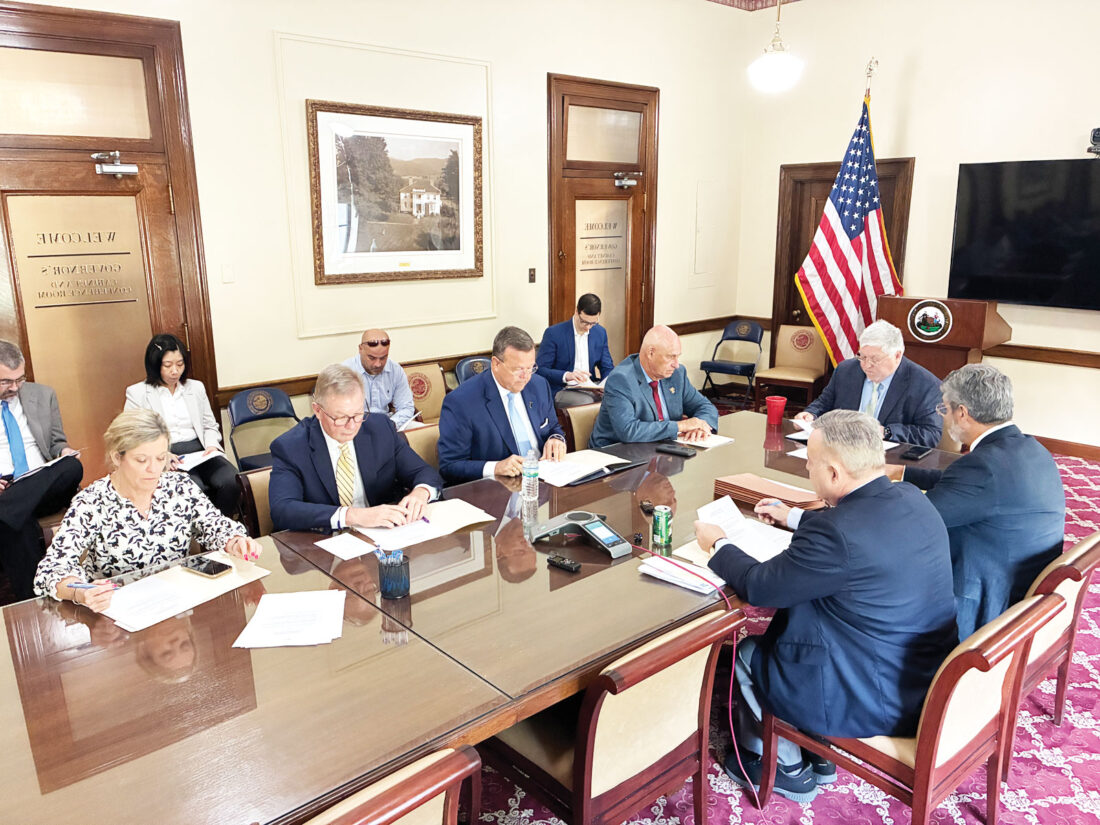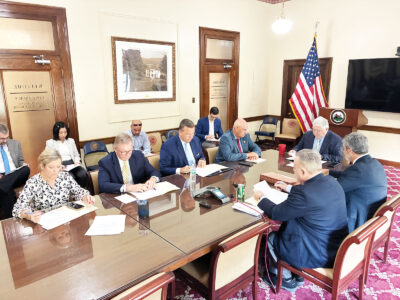West Virginia Board of Public Works begins work on utility property tax assessments

Members of the Board of Public Works met Monday at the State Capitol Building to receive the tentative property tax assessments for utilities and businesses spanning multiple counties for the next tax year. (Photo by Steven Allen Adams)
CHARLESTON — Some of the faces are the same, some of the titles are different, but the process for approving next calendar year’s property tax assessments for major utility and business property continues on. The West Virginia Board of Public Works met Monday morning to accept the tentative values for public service business property for the tax year beginning on Jan. 1, 2026. It is the first step in the process for finalizing property tax rates for large utilities in West Virginia. According to Tax Commissioner Matthew Irby, the tentative tax year 2026 total assessment for all utilities was $16.3 billion, which was 10.2% more than the tax year 2025 total assessment of $14.8 billion, resulting in a $1.5 billion increase in total assessments. The largest driver of increased assessment values was pipelines, which increased from $4.2 billion in tax year 2025 to a tentative amount of $5.4 billion for tax year 2026. That is a 30.5% increase, or $1.3 billion more than the current tax year. “If you look through that packet, you’ll notice the primary amount of that increase is related to finally coming along on large pipeline projects that became operational in June. Those were first assessable by this board for this year. So, that’s the primary increase there.” Agriculture Commissioner Kent Leonhardt noted the difference in the tentative assessed value for underground gas storage, which decreased by 21.7%, from $240.8 million in tax year 2025 to a tentative assessed value of $188.5 million for tax year 2026 – a decrease of $52.3 million. “That increase (in pipeline tentative assessed values) was that what accounted for the (natural) gas storage going down,” Leonhard asked. “I noticed it stuck out that it was a 22% drop in storage. And here we have a lot more wells.” “I’m not 100% sure why,” Irby said. “One of the primary drivers of the gas storage is the price of gas. So, a couple of years ago, we had really high prices of gas. The result of this was really high gas storage values. Now two years on, we’re at sort of almost a low point on the price of gas.” Although most real and personal property is assessed at the local level by county assessors with county commissions approving the final rates, the Board of Public Works approves the real and personal property values of public utilities whose properties stretch across two or more counties. Rather than have each of the 55 assessors determine the value, the property is appraised and assessed by the Tax Division. The types of utilities include airlines, private bridge owners, bus companies, electric providers, natural gas providers, non-cellular communication (paging services), railroads and carlines, pipelines, cell phone companies, private sewer services, landline telephone services, underground gas storage, water and water/sewer services. The owner or operator of every public utility is required to file a report with the state tax commissioner no later than May 1 itemizing the utility’s property for the previous calendar year in detail set out by law. The tax commissioner reviews the reports, obtains any additional information needed, sets the tentative assessment for each utility and mails a copy to the owner or operator of the utility. The Tax Division must deliver the tentative assessments to the Board of Public Works by Sept. 15 and the board then orders the assessments at a meeting to be held no later than Oct. 1. Once accepted, the board recesses until a later date to give companies time to file objections and work with the Tax Division. “We want to note that by October 1st, usually the board convenes to formally receive these assessments, but we actually don’t take the formal action now, because then that allows the tax commissioner to get some of the requests and the appeals in, and then we come back usually in January,” said Gov. Patrick Morrisey, who chairs the Board of Public Works. “This is just an acceptance of these tentative values as we move through the process,” Irby said. “There will be a protest hearing and an opportunity for companies to come in and reject these. We also have an informalized process throughout these next few months where we engage with these companies and see if they have additional information to provide with regard to valuation. Then we come in around January.” The Board of Public Works consists of Morrisey and the state’s elected constitutional officers, including Leonhardt, Secretary of State Kris Warner, Attorney General J.B. McCuskey (represented Monday by a staff member), State Auditor Mark Hunt, and State Treasurer Larry Pack, State Superintendent of Schools Michele Blatt is also a member of the Board of Public Works. Steven Allen Adams can be reached at sadams@newsandsentinel.com.





